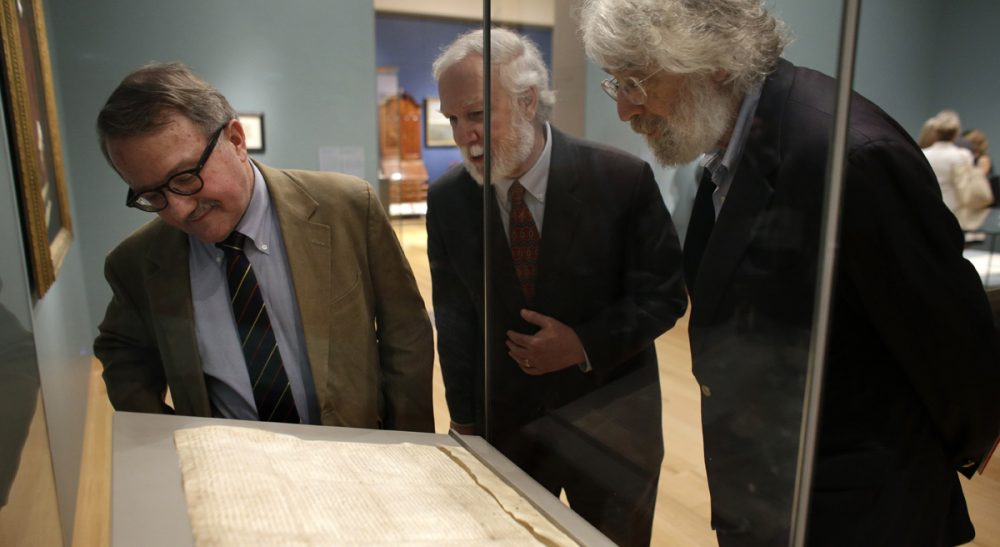Advertisement
Wealth, Power And The Legacy Of The Magna Carta

Imagine a group of the richest and most powerful people in the country who are tired of paying high taxes, having their rights restricted by government, and who just generally don’t like the president. Imagine they get together and agree to use their wealth to force government to behave the way they want. Sound familiar?
It should. It’s the way it has always been, and probably always will be. Wealth is power, even in governments supposedly of, by and for the people. Proof of that uncomfortable truth is on display in Boston in an unlikely form. One of four surviving original copies of the Magna Carta is at the Museum of Fine Arts through Sept. 1.
Wealth is power, even in governments supposedly of, by and for the people.
The document is universally esteemed as foundational in the creation of the rule of law, "liberty and justice for all" as the museum notes, and indeed as the seed that grew into "of and by and for the people" democracy itself. As Franklin Delano Roosevelt put it in his 1941 Inaugural Address, "The democratic aspiration is no mere recent phase in human history … It was written in Magna Carta."
Well, sure, if you stretch things. But the document was actually a deal in 1215 imposed by the richest people in England, the barons, on King John. The wealthy threatened to withhold their money if King John didn’t ease up with his usurious taxes and arbitrary rules that restricted how the barons could run their estates. The rich “one percent” used their wealth to compel government to behave the way they wanted, which was not to serve the interest of the common person … just the rich. The Magna Carta barons were analogous to a super PAC, or wealthy donors or corporations using their wealth to gain special access to lawmakers.
OK, it was a little different than the modern way wealth manipulates government in democracies. Today it’s just money. Back then the barons also had swords, had just captured London, and snatched King John by force from Windsor Castle before making him an offer he couldn't refuse. But rich donors have nearly the same leverage over politicians who need their cash to stay in office. The sword of campaign donations rests at the throat of every politician.
Consider the one clause (out of 61) in this revered document so often cited as the foundation for the rule of law and "a jury of your peers."
"… no freeman ought to be taken, or imprisoned, or disseized of his freehold, liberties, or privileges, or outlawed, or exiled, or in any manner destroyed, or deprived of his life, liberty, or property, but by the judgment of his peers, or by the law of the land.”
Equal rights and the rule of law for all freemen. Cool, right? Except you know who was a freeman? The wealthy barons. Everybody else worked for them or was outright owned by them.
Most of the agreements the barons imposed on a hostage King John had to do with reducing their taxes, insuring their commercial rights, or protecting their estates for their heirs, so they could maintain and expand their wealth without government getting in the way.
As the National Archives says of the Magna Carta: "The interests of the common man were hardly apparent in the minds of the men who brokered the agreement."
The Magna Carta barons were analogous to a Super PAC, or wealthy donors or corporations using their wealth to gain special access to lawmakers.
After King John signed and got back to London, he immediately ignored the whole thing. The barons rented an army from France, drove John out, and French Prince Louis was declared king. But before he was crowned, imprisoned King John died. The conniving wealthy barons turned on their rented French king, kicked him out, and made a more compliant Prince John, the deposed king’s oldest son, King Henry III. They used their wealth and power to put their guy in charge.
The Magna Carta rightly inspires. It was re-worked through successive English rulers and did help establish constitutional government, the rule of law, and the democratic idea that "the people," together, have power. Or at least, they should.
But before we get all rosy-eyed, let’s remember what the "Great Charter" also teaches; that true power lies disproportionately in the hands of the wealthy. It always has. It always will.
Related:
